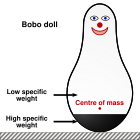
Back الموجود الذهني Arabic Constructo (filosofía) Spanish Konstrukto Basque برساخته (فلسفه) Persian הבניה מנטלית HE Конструкција (филозофија на науката) Macedonian Konstrukt NB Construto Portuguese 建構 Chinese 建構 ZH-YUE

In philosophy, a construct is an object which is ideal, that is, an object of the mind or of thought, meaning that its existence may be said to depend upon a subject's mind. This contrasts with any possibly mind-independent objects, the existence of which purportedly does not depend on the existence of a conscious observing subject.[1] Thus, the distinction between these two terms may be compared to that between phenomenon and noumenon in other philosophical contexts and to many of the typical definitions of the terms realism and idealism also. In the correspondence theory of truth, ideas, such as constructs, are to be judged and checked according to how well they correspond with their referents, often conceived as part of a mind-independent reality.
- ^ Bunge, M. 1974. Treatise on Basic Philosophy, Vol. I Semantics I: Sense and Reference. Dordrecth-Boston: Reidel Publishing Co.
© MMXXIII Rich X Search. We shall prevail. All rights reserved. Rich X Search